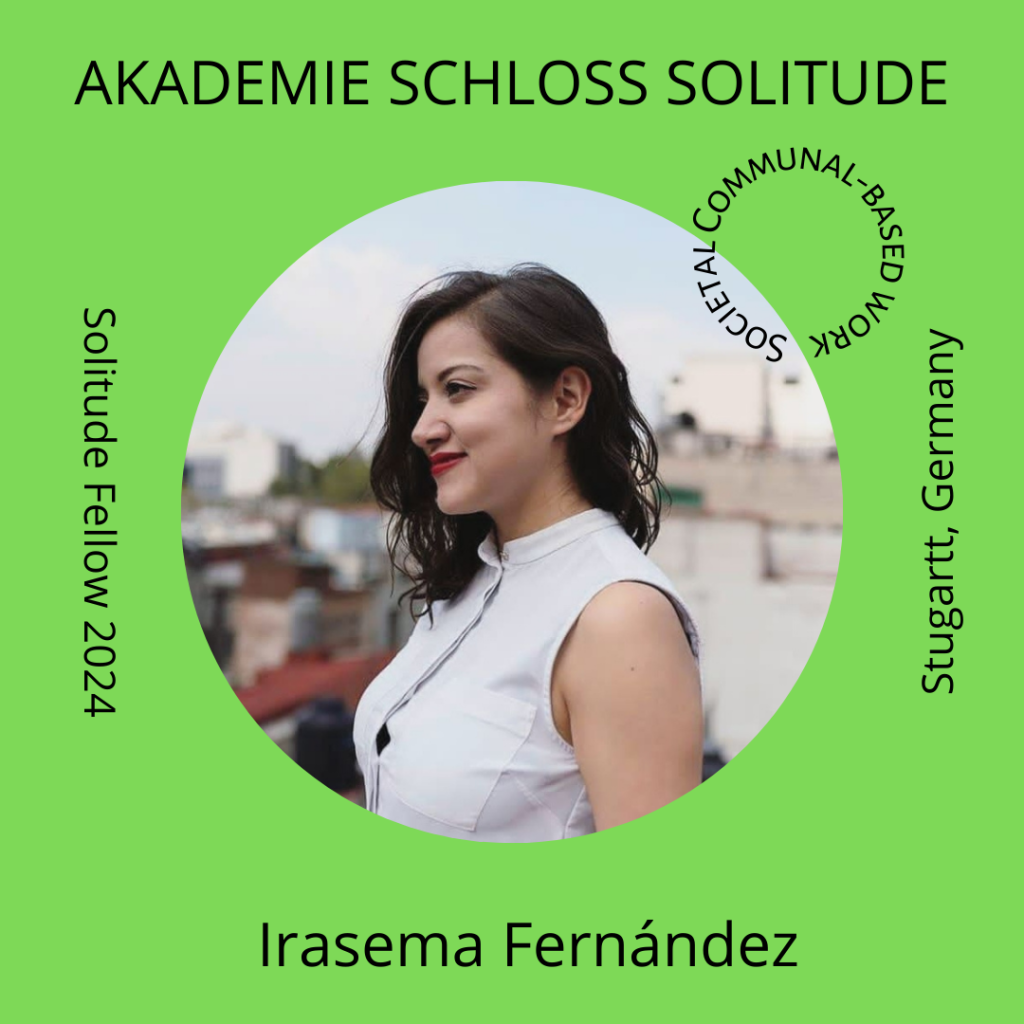Mexico City, Mexico, 1990.
Irasema Fernández is a writer, visual artist and activist. She studied Hispanic Literature and Languages at the National Autonomous University of Mexico. Her work explores narratives about the female body in its political, colonial and cultural contexts.
As an author, she writes essays, novels and short stories. Her work has been published in several literary anthologies and magazines. She has been awarded fellowships in Novel Writing (2021) and Short Story Writing (2018) from the Mexican National Foundation for Culture and the Arts.
Her work as a visual artist is diverse; ranging from oil paintings to murals to graphic design. Her current project The Macedonian Machine: Learning From Bots, is a series of oil paintings that imitates images generated from text prompts related to police violence and state crimes in Mexico during the last sixty years using Artificial Intelligence programs (i.e. Dall-E, Midjourney and NightCafeStudio). The project is inspired by a utopia depicted by the Argentine author Ricardo Piglia in his novel The Absent City in which a machine began to create protest speeches after feeding on the stories of society. In the book, the government found the speeches dangerous. To disable the machine from being used as a tool for social rebellion against the government, the machine was locked in a museum and put on display as a piece of art. The paintings in The Macedonian Machine series, generated with the aid of a computer and then “frozen” in time, similar to the incarcerated machine from Piglia´s book, show how artificial images can maintain their anti-establishment power even when framed as art.
She is also currently working on a street art project, entitled Mobile Narratives, that aims to create safe public spaces through pieces that invite debate on gender violence, sexual abuse, police abuse, machismo, racism and beauty mandates on non-hegemonic bodies. Related to the project, she was invited by the Hay Festival Querétaro (2020) to give a Master Class on how urban art and public protest has been the key to effective community building and cross-cultural dialogue.
Much of Irasema´s artistic work is intrinsically politically motivated and she has been recognized for both her artistic inventions and her activism. For example, in collaboration with other activists, she received the Avina Americas Foundation’s Rapid Response Fund (2021) for the project Against Institutional Machista Violence: to demand information, prevention and reparations for sexual crimes committed by police officers against women, trans and non-binary people. She has also given workshops for Amnesty International and Casa Hogar Paola Buen Rostro, a shelter for trans women.
contact: irasemafdzr@gmail.com
prensa // press
| nacional |
2021
texto: «Arte feminista para expresar causa y sanar las heridas, septiembre 2021, vía Animal Político, Emeequis y Aristegui Noticias.
texto: «Las mujeres y los medios: la responsabilidad en cómo se percibe el feminismo», abril 2021, vía Revista Expansión
charla: «Arte y feminismo con Irasema Fernández», marzo 2021, vía CEM
video: «Conferencia «Coincidencias: revisarnos y narrarnos desde el feminismo», marzo 2021, vía Instituto Cultural de México en España
video + texto: «El artivismo interseccional: de cuerpos femeninos, pandemia y periferias», febrero 2021, vía Canal Once
texto: «Para mí el arte consiste en crear espacios seguros», enero 2021, vía El Universal
2020
texto: «Irasema Fernández: Ilustración, arte urbano y movimientos feministas», septiembre 2020, vía Tres Punto Cero
texto: «Mi activismo está en la vía pública: Irasema Fernández», septiembre 2020, vía El Universal Querétaro
texto: «Fiscalización del tono agrava al país: Irasema Fernández», septiembre 2020, vía AM Querétaro
video: Programa especial: jóvenes mirando su presente, febrero 2020, vía Radio Educación
texto: «Igualdad de género y culturas indígenas en el Hay Festival Queretáro», septiembre 2020, vía ADN Cultura
2019
texto: «Arte urbano y neomuralismo en la cdmx», octubre 2019, vía Tierra Adentro
video: «Irasema fernández rompe estereotipos con la ilustración», 2019, vía Once Noticias
video: «Ser mujer en méxico es ser una mujer oprimida», noviembre 2019. Míralo en Notimex
video: «Emergentes irasema fernández», noviembre 2019. Míralo en Canal 22
video: «Rewind: irasema fernández», octubre 2019, lectura breve vía Cuadrivio
video: «La segunda primavera violeta», agosto 2019. Míralo en Notimex
radio: «Mujeres desde la periferia (colectivo efímero)», agosto 2019. Escúchalo en Revista de la Universidad
radio: «Irasema Fernández en Cultura Urbana», 2019. Escúchalo en Código Radio
| internacional |
2020
texto: «Morse dalle tigri, storie di donne e di violenza messicana. Reportage dal Paese più violento al mondo per le donne: da un’attivista, i suoi murales, ai numeri del femminicidio», marzo 2020, vía Marie-Claire Italia
texto: «In Harm’s Way. A plague of unsolved feminicides haunts Mexico», marzo 2020, vía Harper’s Magazine
| algunas notas donde mencionan mi trabajo |
2021
texto: «El arte y la ciencia: libertad de tránsito para las mujeres», marzo 2021, vía Milenio
2020
texto: «Conversatorios sobre feminismo, deporte, literatura…», septiembre 2020, vía Klever
texto: «Hay Festival Querétaro celebró tercera jornada de conversatorios», septiembre 2020, vía Opción de Veracruz
2019
video: «Cinco voces en contra de la violencia de género», agosto 2019, vía Aristegui Noticias
2018
texto: «Intervención artística colectiva: mujeres desde la periferia», noviembre 2018, vía Sonia Madrigal
